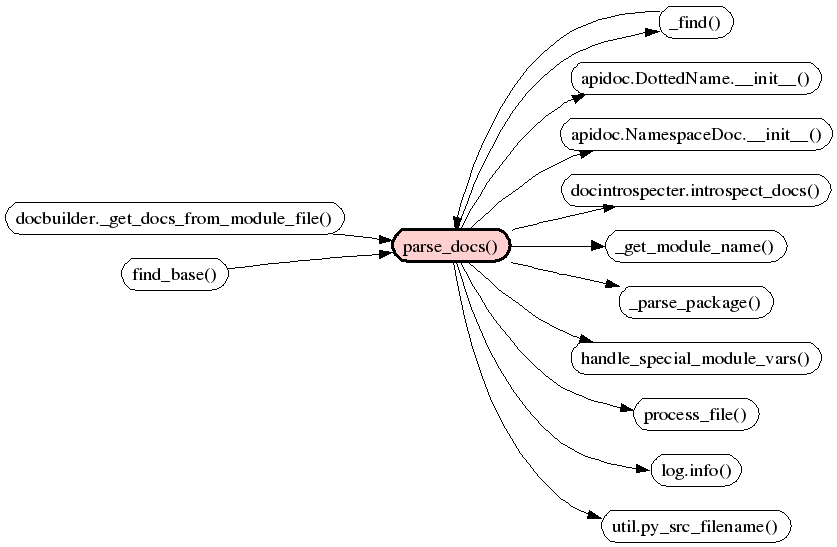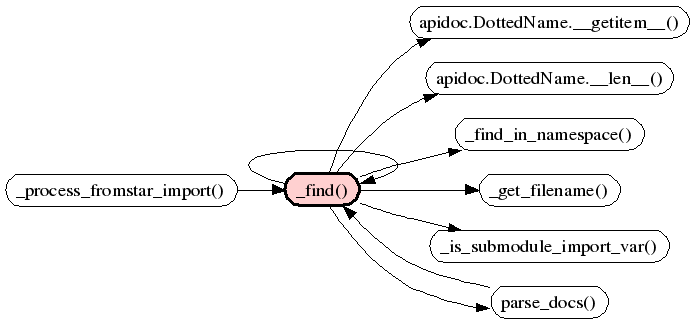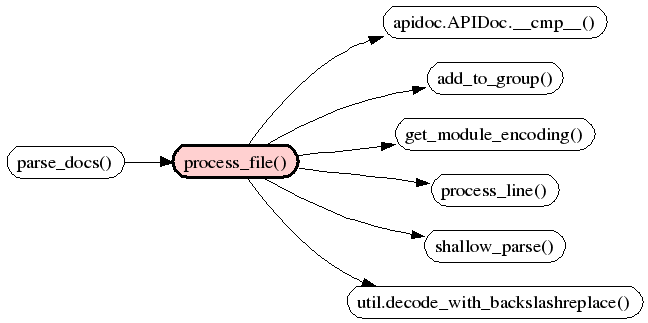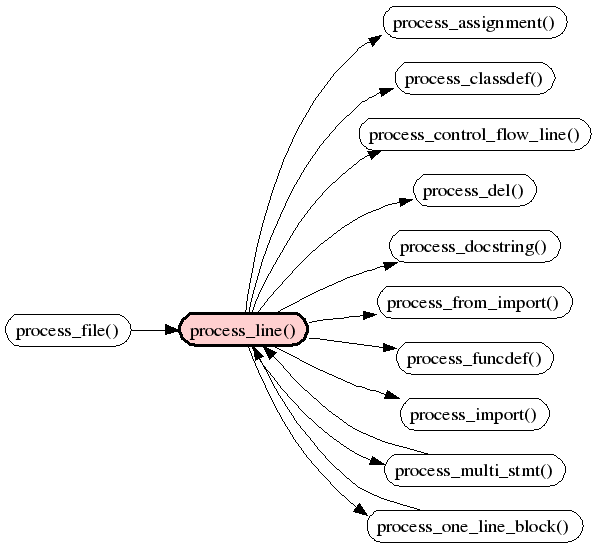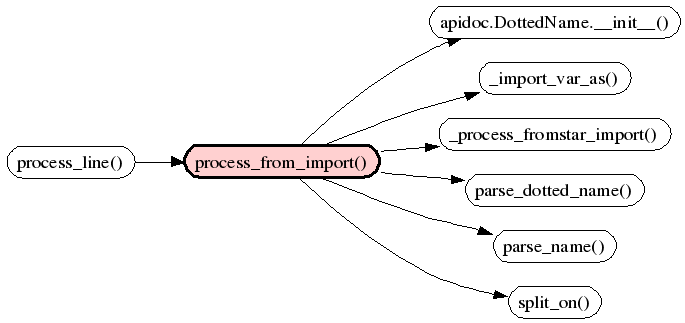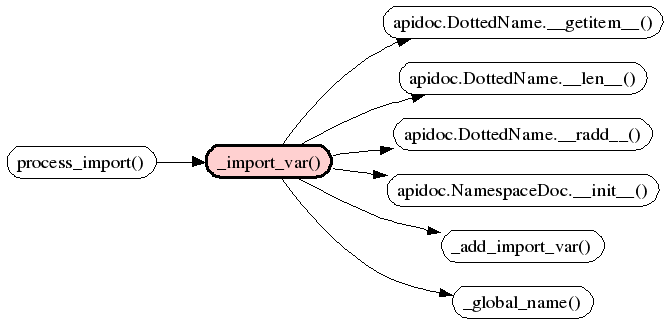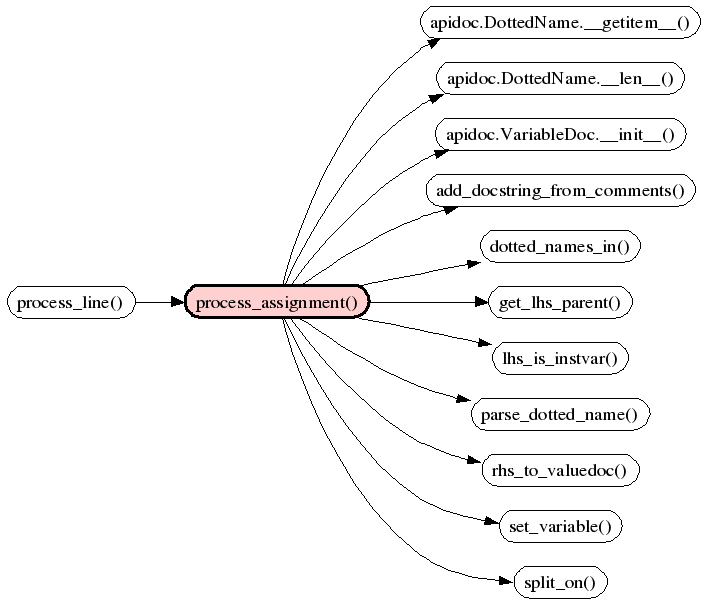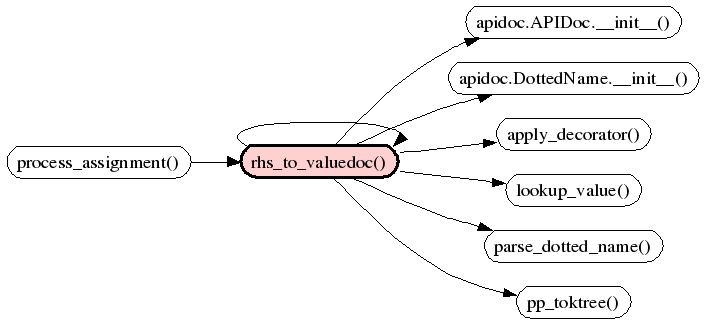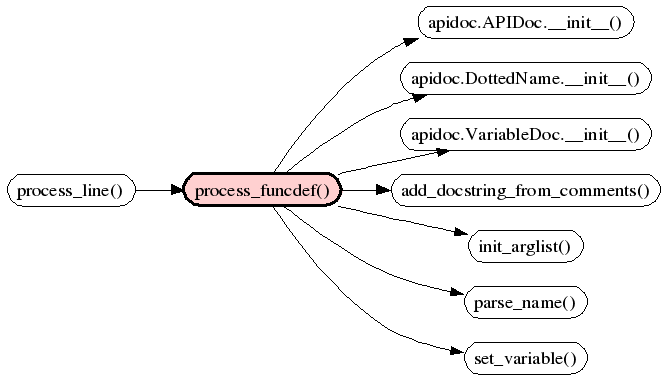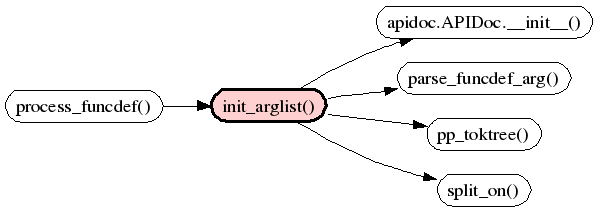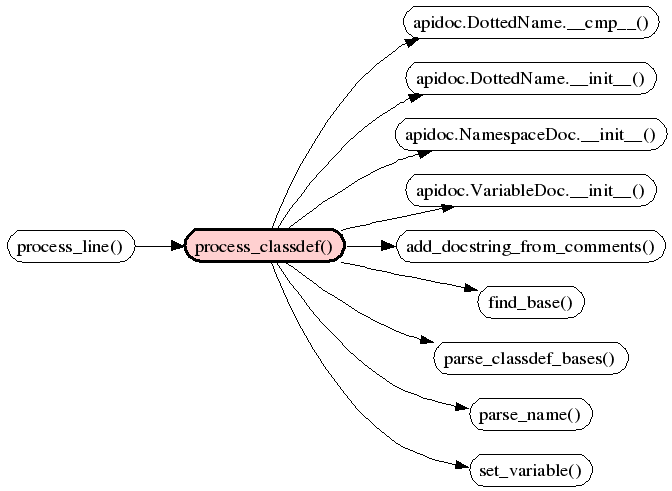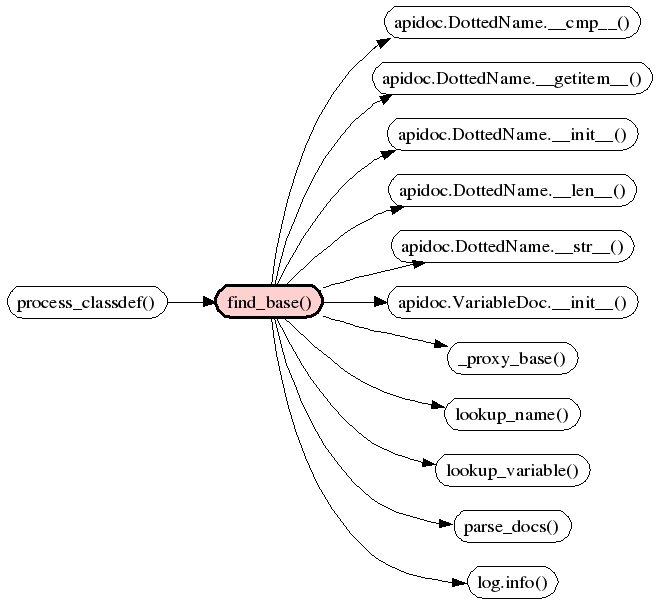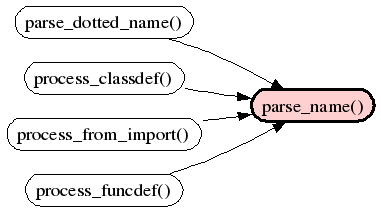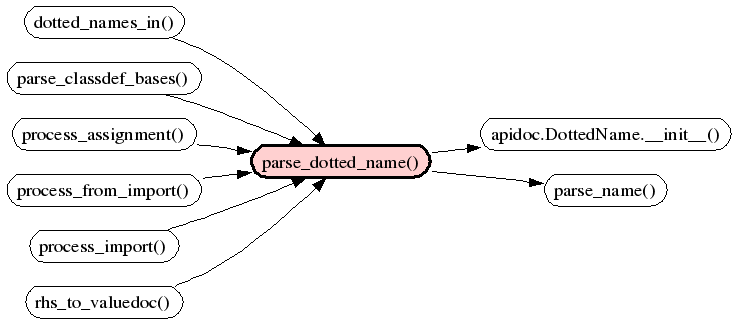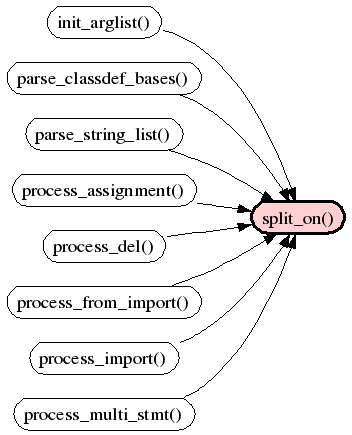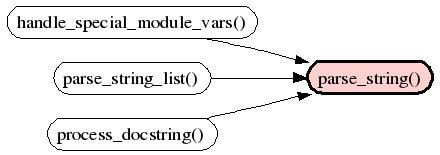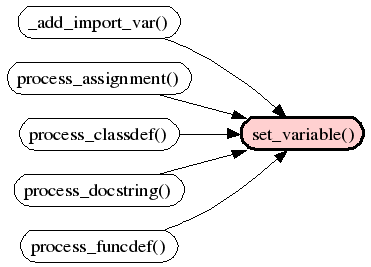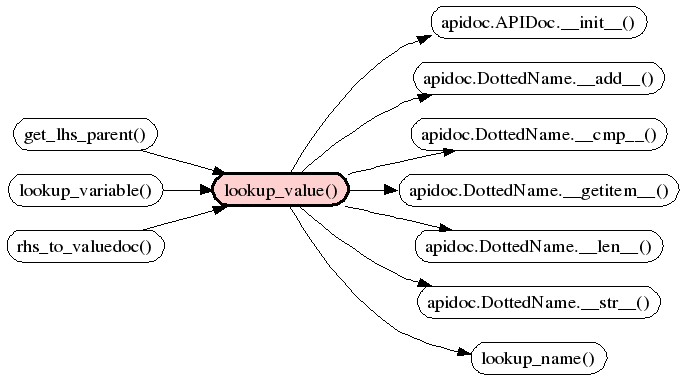| Functions |
| parse_docs(filename=True,
name=True,
context=True,
is_script=True) Generate the API documentation for a specified object by parsing Python source files, and return it as a ValueDoc. |
source code
call graph |
| _parse_package(package_dir) If the given directory is a package directory, then parse its __init__.py file (and the __init__.py files of all ancestor packages); and return its ModuleDoc. |
source code
call graph |
| handle_special_module_vars(module_doc) |
source code
call graph |
| _module_var_toktree(module_doc, name) |
source code
call graph |
| _find(name,
package_doc=True) Return the API documentaiton for the object whose name is name. |
source code
call graph |
| _is_submodule_import_var(module_doc,
var_name) Return true if var_name is the name of a variable in
module_doc that just contains an
imported_from link to a submodule of the same name. |
source code
call graph |
| _find_in_namespace(name, namespace_doc) |
source code
call graph |
| _get_filename(identifier, path=True) |
source code
call graph |
| process_file(module_doc) Read the given ModuleDoc's file, and add variables
corresponding to any objects defined in that file. |
source code
call graph |
| add_to_group(container, api_doc, group_name) |
source code
call graph |
| script_guard(line) Detect the idiomatic trick if __name__ ==
"__main__": |
source code
call graph |
| shallow_parse(line_toks) Given a flat list of tokens, return a nested tree structure (called a token tree), whose leaves are identical to the original list, but whose structure reflects the structure implied by the grouping tokens (i.e., parenthases, braces, and brackets). |
source code
call graph |
| process_line(line,
parent_docs,
prev_line_doc,
lineno,
comments,
decorators,
encoding) Returns: new-doc, decorator..? |
source code
call graph |
| process_control_flow_line(line, parent_docs, prev_line_doc, lineno, comments, decorators, encoding) |
source code
call graph |
| process_import(line, parent_docs, prev_line_doc, lineno, comments, decorators, encoding) |
source code
call graph |
| process_from_import(line, parent_docs, prev_line_doc, lineno, comments, decorators, encoding) |
source code
call graph |
| _process_fromstar_import(src,
parent_docs) Handle a statement of the form: |
source code
call graph |
| _import_var(name,
parent_docs) Handle a statement of the form: |
source code
call graph |
| _import_var_as(src,
name,
parent_docs) Handle a statement of the form: |
source code
call graph |
| _add_import_var(src,
name,
container) Add a new imported variable named name to
container, with imported_from=src. |
source code
call graph |
| _global_name(name,
parent_docs) If the given name is package-local (relative to the current context, as determined by parent_docs), then convert it
to a global name. |
source code
call graph |
| process_assignment(line, parent_docs, prev_line_doc, lineno, comments, decorators, encoding) |
source code
call graph |
| lhs_is_instvar(lhs_pieces, parent_docs) |
source code
call graph |
| rhs_to_valuedoc(rhs, parent_docs) |
source code
call graph |
| get_lhs_parent(lhs_name, parent_docs) |
source code
call graph |
| process_one_line_block(line,
parent_docs,
prev_line_doc,
lineno,
comments,
decorators,
encoding) The line handler for single-line blocks, such as: |
source code
call graph |
| process_multi_stmt(line,
parent_docs,
prev_line_doc,
lineno,
comments,
decorators,
encoding) The line handler for semicolon-separated statements, such as: |
source code
call graph |
| process_del(line,
parent_docs,
prev_line_doc,
lineno,
comments,
decorators,
encoding) The line handler for delete statements, such as: |
source code
call graph |
| process_docstring(line,
parent_docs,
prev_line_doc,
lineno,
comments,
decorators,
encoding) The line handler for bare string literals. |
source code
call graph |
| process_funcdef(line,
parent_docs,
prev_line_doc,
lineno,
comments,
decorators,
encoding) The line handler for function declaration lines, such as: |
source code
call graph |
| apply_decorator(decorator_name, func_doc) |
source code
call graph |
| init_arglist(func_doc, arglist) |
source code
call graph |
| process_classdef(line,
parent_docs,
prev_line_doc,
lineno,
comments,
decorators,
encoding) The line handler for class declaration lines, such as: |
source code
call graph |
| _proxy_base(**attribs) |
source code
call graph |
| find_base(name, parent_docs) |
source code
call graph |
| dotted_names_in(elt_list) Return a list of all simple dotted names in the given expression. |
source code
call graph |
| parse_name(elt,
strip_parens=True) If the given token tree element is a name token, then return that name as a string. |
source code
call graph |
| parse_dotted_name(elt_list, strip_parens=True) |
source code
call graph |
| split_on(elt_list, split_tok) |
source code
call graph |
| parse_funcdef_arg(elt) If the given tree token element contains a valid function definition argument (i.e., an identifier token or nested list of identifiers), then return a corresponding string identifier or nested list of string identifiers. |
source code
call graph |
| parse_classdef_bases(elt) If the given tree token element contains a valid base list (that contains only dotted names), then return a corresponding list of DottedNames. |
source code
call graph |
| parse_dotted_name_list(elt_list) If the given list of tree token elements contains a comma-separated list of dotted names, then return a corresponding list of DottedName objects. |
source code |
| parse_string(elt_list) |
source code
call graph |
| parse_string_list(elt_list) |
source code
call graph |
| set_variable(namespace,
var_doc,
preserve_docstring=True) Add var_doc to namespace. |
source code
call graph |
| del_variable(namespace, name) |
source code
call graph |
None
| lookup_name(identifier,
parent_docs) Find and return the documentation for the variable named by the given identifier. |
source code
call graph |
| lookup_variable(dotted_name, parent_docs) |
source code
call graph |
| lookup_value(dotted_name,
parent_docs) Find and return the documentation for the value contained in the variable with the given name in the current namespace. |
source code
call graph |
| add_docstring_from_comments(api_doc, comments) |
source code
call graph |
| _join_toktree(s1, s2) | source code |
| _pp_toktree_add_piece(spacing, pieces, piece) |
source code
call graph |
pp_toktree(elts,
spacing='normal',
indent=0) |
source code
call graph |
| _pp_toktree(elts, spacing, indent, pieces) |
source code
call graph |
| get_module_encoding(filename) |
source code
call graph |
| _get_module_name(filename,
package_doc) Return (dotted_name, is_package) |
source code
call graph |
| flatten(lst,
out=True) Returns: a flat list containing the leaves of the given nested list. |
source code |
